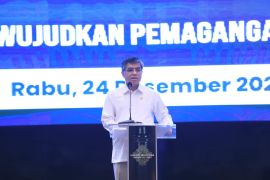The minister explained the e-KTP data would be particularly very useful during the general elections in 2014 and prevent any debate regarding the number of eligible voters.Jakarta (ANTARA News) - In the beginning, the implementation of the electronic identity (e-ID) cards, locally known as e-KTP, got delayed due to the late arrival of data recording equipment reportedly imported from the United States.
Home Affairs Minister Gamawan Fauzi became the main target of criticism because the project was handled by his ministry and was supposed to begin simultaneously in various cities on August 1, 2011.
In response, Gamawan in September said he would resign if the e-KTP programme missed its implementation deadline in late 2012.
The e-KTP project is being implemented in two stages. The first stage was carried out in 197 districts/cities (including Jakarta) in 2011, with a total target of issuing e-KTP to around 67 million residents. And the second stage, in 2012, will cover 300 districts/cities and has a target of around 105 million people.
"If the target cannot be met, I will resign as home affairs minister," Gamawan said at a hearing with the House of Representatives (DPR)`s Commission II.
The ministry, which has allocated Rp6.3 trillion ($642 million) from the state budget for the introduction of e-KTP nationwide, is optimistic that the project will provide at least 170 million people with e-KTP by late 2012.
Indonesia`s total population is around 237 million, but only those above 17 years old are eligible for e-KTP.
An Indonesian Corruption Watch (ICW) activist, Tama S Langkun, accused the minister of being arrogant because of his statement about resigning if the project was not completed on schedule.
He said the minister would face the consequences of his statement if his staff continued to underperform.
"The home affairs minister must continuously monitor the performance of his subordinates and staff members at the ministry to make sure that the e-KTP project will be completed as scheduled in 2012," Tama stated at a discussion forum on "Polemics: The e-KTP Fuss" in Jakarta in September 2011.
However, Irman, the ministry`s acting director general of population and civil registration, denied that the minister was arrogant for making such a statement. He said the ministry`s personnel would fully support the implementation of the project.
"We don`t want our minister to face a difficult situation, so we will work hard to make sure the e-KTP project will finish on time," Irman added.
So, once the equipment became available, the home affairs ministry and regional administration personnel throughout Indonesia worked hard. They worked day and night even on Sundays to record the data of millions of people eligible for the e-KTP.
And the result of their hard work has made the minister not only satisfied but also proud.
"We have achieved the e-KTP target, surpassing the achievements of similar e-ID card projects in advanced nations such as Germany, the United States, and India," Gamawan said on May 8, 2012.
He claimed Indonesia had reached its e-KTP target faster than any other nation previously had.
"Within one and a half years, we have made 172 million cards. During the October-April period, we made 70 million," the minister added.
The ministry aimed to cover 67 million people in 197 districts and cities during the e-KTP data recording process in 2011, but it has exceeded the target, with 72 million people.
During the first stage, about 90,000 people tried to have their data recorded twice, but such attempts were thwarted by the authorities, thanks to the support of the sophisticated technologies used in the process.
The home affairs ministry has submitted the perpetrators` names to the security authorities to investigate the motives behind their actions.
In the second phase this year, the data recording will be carried out in 300 districts and cities until October. Gamawan expressed hope that around one million people per day throughout Indonesia would come for the recordings.
"In India, it took a year to make five million e-ID cards, while Germany took six years to produce 70 million cards," he noted.
"For our achievement, I will fly to Abu Dhabi to speak before representatives from 45 nations, where we will share our experiences in meeting the e-KTP target. In July, I will be invited as a keynote speaker in the United States of America," Gamawan said.
During a recent visit to Padang, West Sumatra, the minister announced his ministry and the National Police (Polri) would join hands in using e-KTP data in July 2012.
"Insurance companies have forged cooperation with the home affairs ministry, and on the occasion of the anniversary of Polri, we will do it with the police," he said.
In addition to Polri, many other institutions also want to sign cooperation agreements with the home affairs ministry on e-KTP data usage. The e-KTP data could be used by the police, the coordinating ministry for peoples` welfare, and the defence forces (TNI), as well as in education, insurance, and many other sectors. It is also useful for the state`s security and the prevention of terrorism, according to Gamawan.
The minister explained the e-KTP data would be particularly very useful during the general elections in 2014 and prevent any debate regarding the number of eligible voters. In 2011, around seven million Indonesians had more than one Single Identity Number (NIK), which means each of them had more than one ID card.
"District heads and mayors can gather [the population] data from the home affairs ministry in January next year, or in April 2013 at the latest. Hopefully, there will be no more mix-up of data prior to the general elections," he added.
Supporting the minister`s statement, House Speaker Marzuki Alie earlier said the e-KTP programme was crucial for the success of the general elections in 2014 as well as regional elections.
"The e-KTP programme is also an important breakthrough programme of the government," he added.
"The e-KTP programme must be able to carry out the administrative work orderly. So, the accuracy of population data collection will be stronger," Marzuki stated.
He urged the people to support the programme which could help build a healthy democracy. "Why is it so? Because it will collect the accurate population data," he explained.
Ari G Dwipayana, a political observer of the University of Gadjah Mada (UGM), also lauded the programme, saying it would help measure the country's population accurately, which was very important for the success of the general elections.
He said the government should give priority to Java and Sumatra islands in the online population data system, because the two islands were home to most of Indonesia`s population.
In November 2011, the government assured the people's personal data under Indonesia`s e-KTP system were well secured and protected from tampering or duplication.
"A person`s data in the e-ID cards cannot be easily broken into because it is protected by technological systems devised by a team of experts in their fields," Reydonnyzar Moenek, a Home Affairs Ministry official said.
"The e-KTP system also needs to be protected by everyone, so that people`s private demographic data cannot be used by irresponsible parties," he added.
"The successful implementation of the e-KTP programme requires synergy among all parts of the nation," Reydonnyzar stated.(*)
Reporter: Fardah
Editor: Heru Purwanto
Copyright © ANTARA 2012











